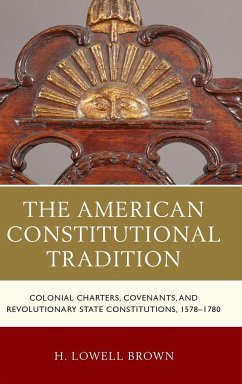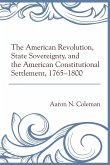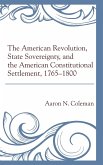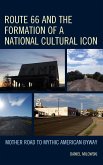The book is a work of non-fiction. The book is a historical analysis of the evolution of a uniquely American constitutionalism that began with the original English royal charters for the exploration and exploitation of North America. When the U.S. Constitution was written in 1787, the accepted conception of a constitution was that of the British constitution, upon which the colonists had relied in asserting their rights with respect to the imperium, comprised of ancient documents, parliamentary enactments, administrative regulations, judicial pronouncements, and established custom. Of equal significance, the laws comprising the constitution did not differ from other statutes and as a consequence, there was no law endowed with greater sanctity than other legislative enactments. In framing the revolutionary state constitutions following the retreat of the crown governments in the colonies, as well as the later federal Constitution, the Revolutionaries fundamentally reconceived a constitution as being the single authoritative source of fundamental law that was superior to all other statutes, regulations, and judicial decisions, that was ratified by the states and that was subject to revision only through a formal amendment process. This new constitutional conception has been hailed as the great innovation of the revolutionary period, and deservedly so. This American constitutionalism had its origins in the now largely overlooked royal charters for the exploration of North America beginning with the charter granted to Sir Humphrey Gilbert by Elizabeth I in 1578. The book follows the development of this constitutional tradition from the early charters of the Virginia Companies and the covenants entered of the New England colonies, through the proprietary charters of the Middle Atlantic colonies. On the basis of those foundational documents, the colonists fashioned governments that came to be comprised not only of an executive, but an elected legislature and a judiciary. In those foundational documents and in the acts of the colonial legislatures, the settlers sought to harmonize their aspirations for just institutions and individual rights with the exigencies and imperatives of an alien and often hostile environment. When the colonies faced the withdrawal of the crown governments in 1775, they drew on their experience, which they formalized in written constitutions. This uniquely American constitutional tradition of the charters, covenants and state constitutions was the foundation of the federal Constitution and of the process by which the Constitution was written and ratified a decade later.
Hinweis: Dieser Artikel kann nur an eine deutsche Lieferadresse ausgeliefert werden.
Hinweis: Dieser Artikel kann nur an eine deutsche Lieferadresse ausgeliefert werden.








